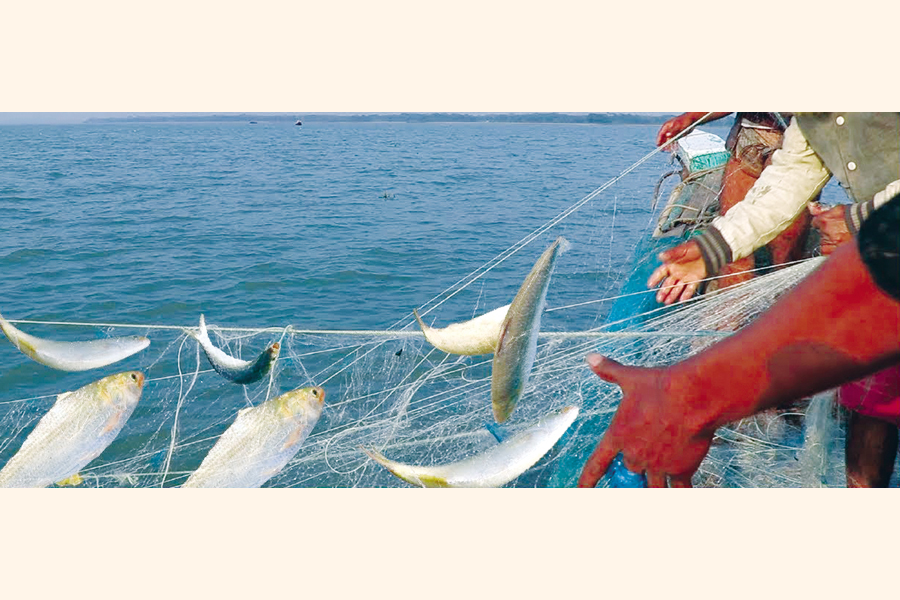Black_cats
ELITE MEMBER

- Joined
- Dec 31, 2010
- Messages
- 10,031
- Reaction score
- -5
A CLOSE LOOK: Are hilsas turning away from Bangladesh's territorial waters?
Nilratan HalderPublished :
May 19, 2023 01:18 PM
Updated :
May 19, 2023 01:22 PM
Two years ago, the euphoria over plenty of hilsa catch did not at all look out of step. But last year, there was a rude shock. Apart from a handful of lucky hauls by fishermen in the country's southern waters, hilsa was a rarity in the rivers, particularly in the Padma, famous for the best of the king of fishes. This year may as well follow the previous year's pattern of lean catch. After a ban on fishing in the five hilsa reserves from March 1 to April 30, expectation was high that this most favourite species would be available plentifully in the market. But there has been a great disappointment.
Scarcity of hilsa and its forbidding price in the market should not escape the people's notice. But there should be an explanation for the absence of hilsa in the country's rivers after two months' ban on fishing. A report carried on the inside page of a Bangla contemporary says that pollution in the country's rivers has driven hilsas to change their channels. How authentic the explanation is cannot be verified unless experts in the matter confirm it. The question that ought to be asked is, if hilsa has moved to new channels which they are. Are those out of Bangladesh's territorial waters?
The way waters are getting polluted in Bangladesh rivers, it is quite possible. But waters in the rivers of the neighbouring countries are also not particularly pollution-free.
In that case, hilsas may opt for the relatively less polluted rivers that open up to the Bay of Bengal. Here is a fish that spends most of its life in the sea and comes to sweet waters of inland water for laying eggs. So, they get caught both in rivers and in the Bay.
Now a lack of hilsa means many things all at once. Fishermen who catch hilsa for their livelihoods are the first to suffer a huge blow.
Their sufferings are likely to compound further with the imposition of another round of ban on marine fishing. This time the ban is for as long as 65 days starting today. The peak hilsa fishing season is not far off. What is more, fishermen had to return to safety days before Mocha made its landfall. For more than a week, fishermen had to stay idle. Before they could make forays into the sea, another ban comes. Fishermen in the coastal areas are engaged both in inland fishing in the coastal rivers and marine fishing. They are often the victims of the worst exploitation.
The risks to their life are always great but instead of any reward for that, they get a raw deal from all concerned. Even the allocation for them during the fishing bans is either insufficient or at times unavailable. In case of their death in the sea on account of natural calamities and at the hands of robbers, their families become paupers. When their vessels stray away into territorial waters of neighbouring countries for unavoidable reasons, most likely they land in jails. If they are lucky, coast guards of those countries hand them over to Bangladesh coast guards.
Compared to the ordeals fishermen go through and the income loss they sustain due to scarcity of hilsa, the missing of the delicacy by the public is nothing. Yet, it is a fact that the Bangalees' taste buds remain deeply troubled, perched to be precise, if those are deprived of the seasonal treat. Last year fishermen in the river Baleswar failed to catch hilsa but they were compensated by huge catches of a different species called pangas (silver catfish).
But this is small consolation for fishermen elsewhere and the hilsa lovers. Even the department of fisheries and others counting on a burgeoning hilsa economy will be terribly disappointed if the fish moves away even after lengthy bans on two occasions. Hilsa experts will have to gear up their studies in order to find where things have gone wrong. Fishermen's livelihoods will be at risk and the Bangalees in general will feel disconnected from a savouring legacy, a history of its own and a proud cuisine culture. Perhaps the ban alone will not do.
Maybe, there will be a need to rein in the widespread industrial, agricultural, plastic and polythene pollution to bring hilsas back to the rivers of the country.

Are hilsas turning away from Bangladesh's territorial waters?
Two years ago, the euphoria over plenty of hilsa catch did not at all look out of step. But last year, there was a rude shock. Apart from a handful of lucky hauls by fishermen in the country's southern waters, hilsa was a rarity in the rivers, particularly in the Padma, famous for the best of the k

